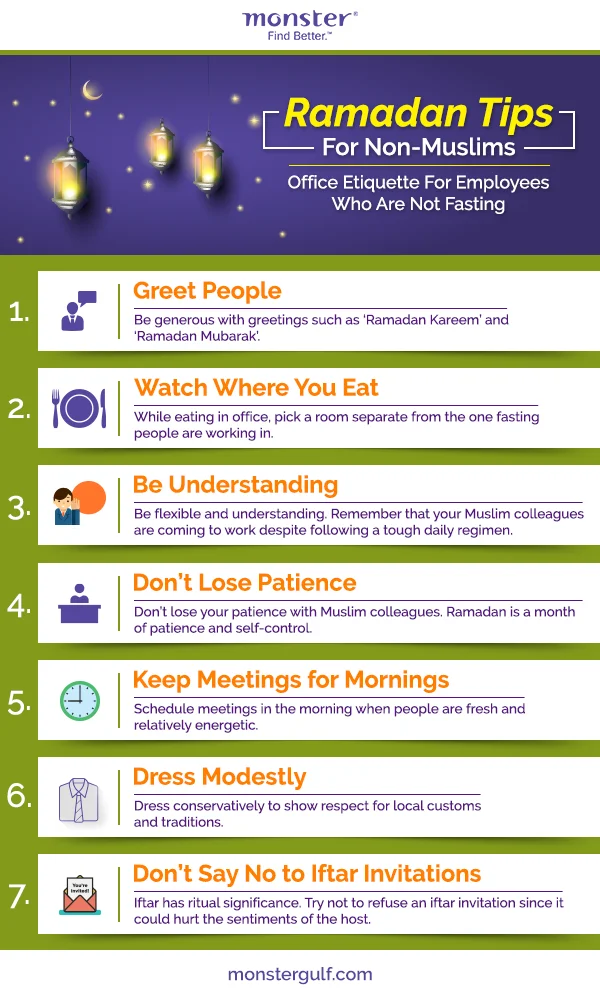As the holy month of Ramadan approaches, it’s important for non-Muslims to understand and respect the significance of this time for their Muslim colleagues and friends.
Ramadan is a month of fasting, prayer, reflection, and community for Muslims around the world. In this blog post, we’ll provide a comprehensive guide for non-Muslims in the workplace, helping them navigate this period with sensitivity and awareness.
Understanding Ramadan
Ramadan is the ninth month of the Islamic lunar calendar and holds immense spiritual significance for Muslims. It is a time of fasting, self-reflection, increased devotion, and acts of charity.
During this month, Muslims fast from dawn (Suhoor) until sunset (Iftar), abstaining from food, drink, and other physical needs. Fasting during Ramadan is one of the Five Pillars of Islam and is observed by Muslims as an act of worship and obedience to God.
How Does Ramadan Affect the Workplace?
For non-Muslims working alongside their Muslim colleagues, it’s essential to recognize that Ramadan can impact the workplace dynamics in several ways:
- Changes in Work Hours: Muslims who are fasting may adjust their working hours to accommodate Suhoor (pre-dawn meal) and Iftar (meal to break the fast). This can result in flexible schedules, with some preferring to start work early and finish early.
- Reduced Energy Levels: Fasting can lead to decreased energy levels and concentration in the late afternoon. Non-Muslim colleagues should be understanding and accommodating during this time.
- Increased Prayer and Reflection: Muslims engage in extra prayers and recitation of the Quran during Ramadan. This may mean short breaks for prayer throughout the day.
- Iftar Gatherings: Many Muslims invite colleagues to join them for Iftar meals to share the experience and foster understanding. These gatherings can be a great opportunity for building relationships.
How Non-Muslims Can Be Supportive
- Be Informed: Take the time to learn about Ramadan, its significance, and the basic customs and practices. This shows respect and empathy.
- Flexible Scheduling: If possible, accommodate flexible working hours for Muslim colleagues during Ramadan, allowing them to start and finish work earlier.
- Respect Dietary Restrictions: Avoid eating or drinking in front of fasting colleagues. If you plan team meetings, consider scheduling them after Iftar.
- Provide Space for Prayer: Offer a quiet space for Muslim colleagues to perform their daily prayers if your workplace allows.
- Engage in Inclusive Conversations: Ask questions and engage in conversations about Ramadan. Your interest and respect will be appreciated.
- Join Iftar Meals: If you receive an invitation to an Iftar gathering, consider attending. It’s an excellent opportunity to connect and learn more about the culture and traditions.
FAQ on Ramadan At The Workplace
FAQ 1: What is Ramadan, and why is it important for Muslims in the workplace?
Answer: Ramadan is the ninth month of the Islamic lunar calendar and holds great religious significance for Muslims. It involves fasting from sunrise to sunset, increased prayers, and acts of charity. Understanding Ramadan is essential to support Muslim colleagues during this time.
FAQ 2: How does fasting during Ramadan affect Muslim colleagues in the workplace?
Answer: Fasting means abstaining from food, drink, and other physical needs during daylight hours. This can lead to changes in energy levels and work schedules as Muslims adjust their routines. It’s important to be respectful and accommodating.
FAQ 3: Are there any specific workplace considerations during Ramadan?
Answer: Yes, during Ramadan, it’s considerate to schedule important meetings and tasks in the morning when energy levels are higher. Providing a quiet space for prayers and being mindful of eating in front of fasting colleagues are also good practices.
FAQ 4: How can non-Muslim colleagues show support and respect during Ramadan?
Answer: Non-Muslims can show support by being informed about Ramadan, offering flexibility in work schedules, and refraining from eating or drinking in front of fasting colleagues. Engaging in inclusive conversations and joining Iftar gatherings can foster understanding.
FAQ 5: Is it appropriate for non-Muslims to attend Iftar gatherings during Ramadan?
Answer: Yes, it’s often appreciated when non-Muslims accept invitations to Iftar meals. It’s an excellent opportunity to learn more about Ramadan, build relationships, and demonstrate inclusivity and respect.
Related Articles :
Gulf Job Market Interview Success: Dos and Don’ts |
| Five facts you need to know if you’re looking for a job in the Gulf |
| 4 emerging industries in the Gulf that are on hiring binge |




